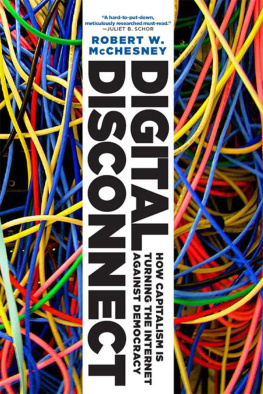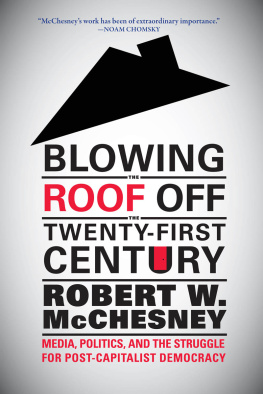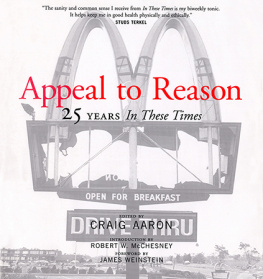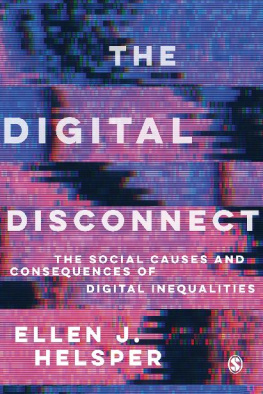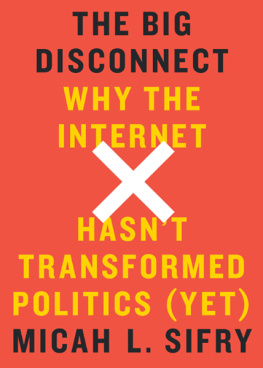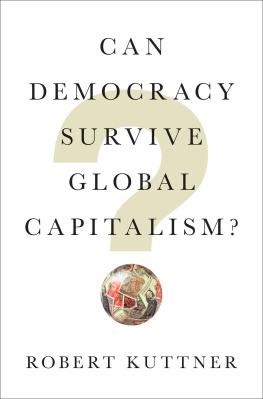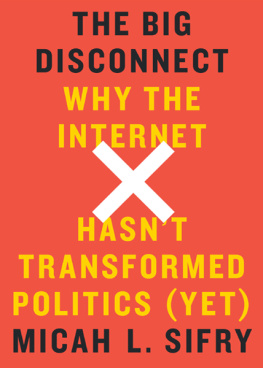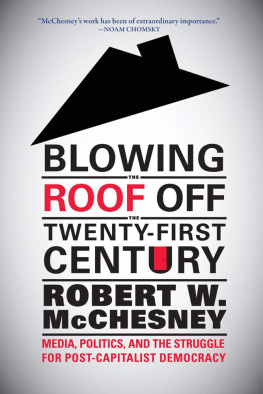Robert Waterman McChesney - Digital Disconnect: How Capitalism Is Turning the Internet Against Democracy
Here you can read online Robert Waterman McChesney - Digital Disconnect: How Capitalism Is Turning the Internet Against Democracy full text of the book (entire story) in english for free. Download pdf and epub, get meaning, cover and reviews about this ebook. year: 2014, publisher: The New Press, genre: Politics. Description of the work, (preface) as well as reviews are available. Best literature library LitArk.com created for fans of good reading and offers a wide selection of genres:
Romance novel
Science fiction
Adventure
Detective
Science
History
Home and family
Prose
Art
Politics
Computer
Non-fiction
Religion
Business
Children
Humor
Choose a favorite category and find really read worthwhile books. Enjoy immersion in the world of imagination, feel the emotions of the characters or learn something new for yourself, make an fascinating discovery.
- Book:Digital Disconnect: How Capitalism Is Turning the Internet Against Democracy
- Author:
- Publisher:The New Press
- Genre:
- Year:2014
- Rating:5 / 5
- Favourites:Add to favourites
- Your mark:
- 100
- 1
- 2
- 3
- 4
- 5
Digital Disconnect: How Capitalism Is Turning the Internet Against Democracy: summary, description and annotation
We offer to read an annotation, description, summary or preface (depends on what the author of the book "Digital Disconnect: How Capitalism Is Turning the Internet Against Democracy" wrote himself). If you haven't found the necessary information about the book — write in the comments, we will try to find it.
Digital Disconnect: How Capitalism Is Turning the Internet Against Democracy — read online for free the complete book (whole text) full work
Below is the text of the book, divided by pages. System saving the place of the last page read, allows you to conveniently read the book "Digital Disconnect: How Capitalism Is Turning the Internet Against Democracy" online for free, without having to search again every time where you left off. Put a bookmark, and you can go to the page where you finished reading at any time.
Font size:
Interval:
Bookmark:
Robert Waterman McChesney

All Your Books Are Belong To Us !
http://c3jemx2ube5v5zpg.onion
How Capitalism Is Turning the Internet Against Democracy
Copyright 2013 Robert Waterman McChesney
Published by The New Press
Celebrants and skeptics alike have produced valuable analyses of the Internets effect on us and our world, oscillating between utopian bliss and dystopian hell. But according to Robert W. McChesney, arguments on both sides fail to address the relationship between economic power and the Internet.
McChesneys award-winning Rich Media, Poor Democracy skewered the assumption that a society drenched in commercial information is a democratic one. In Digital Disconnect, McChesney returns to this provocative thesis in light of the advances of the digital age. He argues that the sharp decline in the enforcement of antitrust violations, the increase in patents on digital technology and proprietary systems and massive indirect subsidies and other policies have made the Internet a place of numbing commercialism. A handful of monopolies now dominate the political economy, from Google, which garners a 97 percent share of the mobile search market, to Microsoft, whose operating system is used by over 90 percent of the worlds computers.
Capitalisms colonization of the Internet has spurred the collapse of credible journalism and made the internet an unparalleled apparatus for government and corporate surveillance and a disturbingly antidemocratic force.
In Digital Disconnect, Robert McChesney offers a groundbreaking critique of the Internet, urging us to reclaim the democratizing potential of the digital revolution while we still can.
Discussed in David Weinberger, Too Big to Know (New York: Basic Books, 2011), 7.
Eli Pariser, The Filter Bubble: What the Internet Is Hiding from You (New York: Penguin, 2011), 11.
Rachel Botsman and Roo Rogers, Whats Mine Is Yours: The Rise of Collaborative Consumption (New York: Harper Business, 2010), xiv; Peter H. Diamandis and Steven Kotler, Abundance: The Future Is Better Than You Think (New York: The Free Press, 2012), 282.
Nicholas Carr, The Shallows: What the Internet Is Doing to Our Brains (New York: W.W. Norton, 2010), 910, 87.
Cited in Jeffrey D. Sachs, The Price of Civilization: Reawakening American Virtue and Prosperity (New York: Random House, 2011), 15455.
Elizabeth K. Englander, Research Findings: MARC 2011 Survey Grades 312, Research Reports, paper 2, 2011, http://vc.bridgew.edu/marc_reports/2.
Lori Andrews, I Know Who You Are and I Know What You Did: Social Networks and the Death of Privacy (New York: The Free Press, 2011), 3.
Carr, Shallows, 910.
Diamandis and Kotler, Abundance, x, 9.
Cited in Pamela Lund, Massively Networked: How the Convergence of Social Media and Technology Is Changing Your Life (San Francisco: PLI Media, 2011), 3.
Rebecca J. Rosen, A World With More Phones Than People, The Atlantic, July 19, 2012, theatlantic.com/technology/archive/2012/07/a-world-with-more-phones-than-people/260069/.
Michael Manges, Overview, in Maximizing Mobile (Washington, DC: World Bank Group, 2012), 11.
E-mail to author from Ben Scott, Mar. 21, 2012.
Lund, Massively Networked, 3.
James Curran, Reinterpreting the Internet, in James Curran, Natalie Fenton, and Des Freedman, Misunderstanding the Internet (Routledge, 2012), 3.
Robin Mansell, Imagining the Internet: Communication, Innovation, and Governance (Oxford: Oxford University Press, 2012), 12.
Clay Shirky, Cognitive Surplus: Creativity and Generosity in a Connected Age (New York: Penguin, 2010), 213, 27.
Henry Jenkins, Convergence Culture: Where Old and New Media Collide (New York: New York University Press, 2006), 4.
Michael Nielsen, Reinventing Discovery: The New Era of Networked Science (Princeton, NJ: Princeton University Press, 2012), 3, 6, 10, 41. See also The Wow Factor, The Economist, Mar. 10, 2012, 92.
Yochai Benkler, The Penguin and the Leviathan: How Cooperation Triumphs over Self-Interest (New York: Crown Business, 2011), 3.
Cass R. Sunstein, Republic.com (Princeton, NJ: Princeton University Press, 2001).
Cass R. Sunstein, Infotopia: How Many Minds Produce Knowledge (New York: Oxford University Press, 2006), 8, 9.
Simon Mainwaring, We First: How Brands and Consumers Use Social Media to Build a Better World (New York: Palgrave Macmillan, 2011), 1.
Jeff Jarvis, Public Parts: How Sharing in the Digital Age Improves the Way We Work and Live (New York: Simon & Schuster, 2011), 11, 76.
Manuel Castells, Communication Power (New York: Oxford University Press, 2009), 34662, 43132. This point is discussed in Rebecca MacKinnon, Consent of the Networked: The Worldwide Struggle for Internet Freedom (New York: Basic Books, 2012), 13.
Diamandis and Kotler, Abundance, 25.
Lund, Massively Networked, 141.
Rory OConnor, Friends, Followers and the Future: How Social Media Are Changing Politics, Threatening Big Brands, and Killing Traditional Media (San Francisco: City Lights Books, 2012), 20.
Jarvis, Public Parts, 11.
Shaheed Nick Mohammed, The (Dis)information Age: The Persistence of Ignorance (New York: Peter Lang, 2012), ii, 8.
Mark Bauerlein, The Dumbest Generation: How the Digital Age Stupefies Young Americans and Jeopardizes Our Future (New York: Tarcher/Penguin, 2008), inside flap, 13.
Jaron Lanier, You Are Not a Gadget: A Manifesto (New York: Knopf, 2010), 4950.
Pariser, Filter Bubble, 89, 97. The historians of science that Pariser quotes are Aharon Kantorovich and Yuval Neeman.
Lanier, You Are Not a Gadget, 86.
MacKinnon, Consent of the Networked, especially chap. 3; Evgeny Morozov, The Net Delusion: The Dark Side of Internet Freedom (New York: PublicAffairs, 2011).
Michael Massing writes that those who have followed the Arab Spring uprisings on the ground in 2011 say the role of Facebook and social media has been greatly exaggerated in the West. What caused the change in the Mideast, the New York Times Cairo bureau chief David Kirkpatrick said, was people going into the streets. Indeed, Kirkpatrick said labeling the uprising a Facebook revolution was unpopular with many participants, who regarded it as an attempt to put a Western brand name on the event. See Michael Massing, The Medias Internet Infatuation, Columbia Journalism Review online, August 15, 2012, cjr.org/the_kicker/internet_infatuation.php.
Virginia Eubanks, Digital Dead End: Fighting for Social Justice in the Information Age (Cambridge, MA: MIT Press, 2011), xvxvi.
See the excellent collection: Saul Levmore and Martha Nussbaum, eds., The Offensive Internet: Speech, Privacy, and Reputation (Cambridge, MA: Harvard University Press, 2010).
Viktor Mayer-Schnberger, Delete: The Virtue of Forgetting in the Digital Age (Princeton, NJ: Princeton University Press, 2009).
Font size:
Interval:
Bookmark:
Similar books «Digital Disconnect: How Capitalism Is Turning the Internet Against Democracy»
Look at similar books to Digital Disconnect: How Capitalism Is Turning the Internet Against Democracy. We have selected literature similar in name and meaning in the hope of providing readers with more options to find new, interesting, not yet read works.
Discussion, reviews of the book Digital Disconnect: How Capitalism Is Turning the Internet Against Democracy and just readers' own opinions. Leave your comments, write what you think about the work, its meaning or the main characters. Specify what exactly you liked and what you didn't like, and why you think so.

